With wins by both of our teams in rounds nine and ten, the Americans had put themselves in medal contention, which is a place most teams would be excited to find themselves in such an important event. But with both teams facing India 1, it was clear that victory (and medals) would not easily be secured.
Open
After the nailbiter of round ten, where Uzbekistan unbelievably saved a 2-2 draw against India 2, and Armenia won yet another match against Azerbaijan, these two teams led the field with 17 match points. A point off the pace at 16 match points were India 2, India 1, and USA. A further point back were the Netherlands, Spain, England, Germany, Serbia, and another potential Cinderalla, Moldova.
The top pairings for the 11th and final round were:
Uzbekistan-Netherlands, Armenia-Spain, India-USA, Germany-India 2, Moldova-England.
Before taking a look at the other matchups, let’s take a closer look at the battle between the two pre-tournament, highest-rated teams: USA and India 1.
The first game to finish was on board one. GM Fabiano Caruana faced GM Pentala Harikrishna, who had lost his previous two games. Harikrishna allowed Caruana to play the Nimzo-Indian but seemed to be surprised by Black’s choice of variation and soon it became clear that White had nothing better than to allow a draw by repetition of moves. This was a good, solid start for the U.S. team, neutralizing one of India’s chances with White.
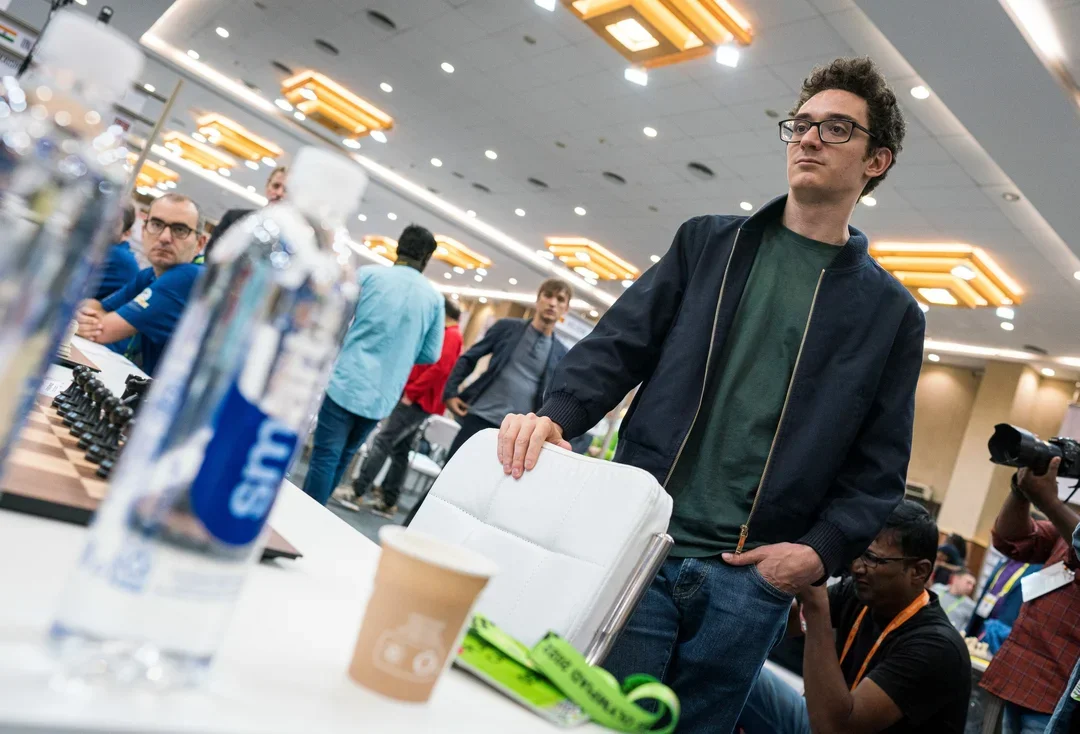
On board two, GM Wesley So got an advantage out of the opening and held it in various sizes and shapes throughout the game. But he could not gain more than a clear advantage, and GM Vidit Gujrathi hung in there to save the draw for India in a long game.
Before GM Gukesh D made his emergence in Biel and particularly here at the Olympiad, it seemed like the next great thing on the Indian sky of chess stars would be GM Arjun Erigaisi. The nineteen-year-old, rated 2683, is obviously far from over the hill. In this event, he played every single round and had scored an impressive 7½/10 before his game on board three against GM Leinier Dominguez Perez, who similarly had performed solidly with 6½/9.
In another Nimzo-Indian, Erigaisi went for the sharp 4. f3 line, Black had a couple of chances to equalize in the opening, but after that, he never let go of the pressure. White won an impressive game and took the individual silver medal on board 3, won 13 rating points and passed 2700 in ELO.
Board four saw GM Sam Shankland facing GM S.L. Narayanan in the third Nimzo-Indian of the match. Shankland, like Harikrishna on board one, went for 4. Qc2, but thanks to some unusual moves by Black, the players soon left known opening theory.
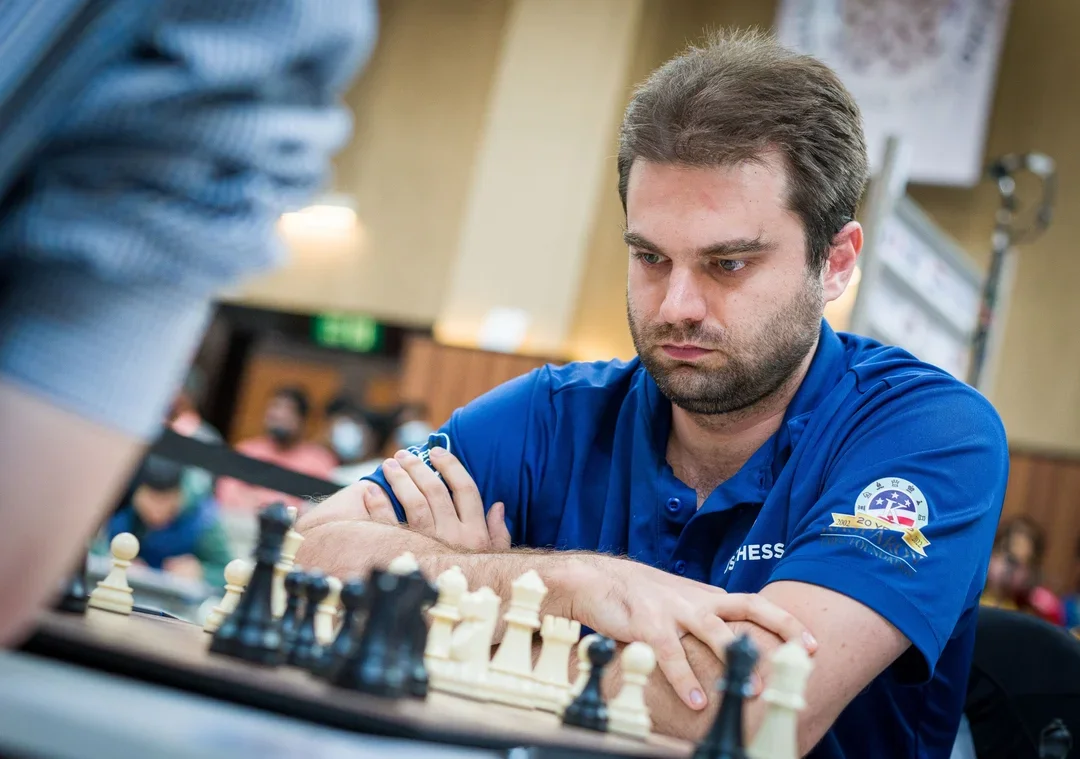
White seemed to have the upper hand, but it while consistently better for White, there was not a clear way through. However, through a determined effort Shankland wore down his opponent who ultimately lost his patience with 47. ... c5?. After that, White converted his advantage in the rook ending with a steady hand and delivered the equalizing point.
With this 2-2 result, both teams were eliminated from the medal race.

Team USA Individual scores:
Fabiano Caruana: 5/10
Levon Aronian: 3½/7
Wesley So: 7/10
Leinier Dominguez Perez: 6½/10
Sam Shankland: 4½/7
With the first two boards clearly struggling and the other boards underperforming according to their ratings, it was surprising that the team was in medal contention at all. Many things may have contributed to this performance, but it is clear that something of an inquest may be required, and none of the players will be heading home satisfied.
The other top matches went as follows:
Uzbekistan-Netherlands – The Uzbek youngsters had already had an amazing tournament, and knew that if they could win the match, the tiebreak (board points of their opponents) would give them the gold. To their credit, they really went for it, and they were better on several boards, but in the end, it was on board four where Vakhidov took down Warmerdam.
Armenia-Spain - This matchup saw GM Gabriel Sargissian take down veteran and former world number two GM Alexey Shirov on board one, while the other games ended in draws. If anything, it was Armenia which had chances for more wins rather than Spain equalizing.
Germany-India 2 – After seeing the victory slip away in heartbreaking fashion against Uzbekistan in round ten, the youngsters picked up a solid victory against the strong Germans. The best game was GM Nihal Sarin’s victory against GM Matthias Bluebaum.
Moldova-England – The Moldovans picked up another sensational victory. The hero of the match was the sole grandmaster of the team, Vladimir Hamitevici, who turned a difficult position around and beat GM Luke McShane with the black pieces.
The medal winners:
Gold: Uzbekistan 19 (TB 435)
Silver: Armenia 19 (TB 382½)
Bronze: India 2 18 (TB 427½)
Behind them on 17 were India (TB 409), USA (TB 352), and Moldova (TB 316½).
In the pretournament seedings, none of the medal winning teams were among the top ten seeds, so they all made for healthy surprises. Similarly, Moldova, with just one grandmaster on the team and seeded 48th, made for a wonderful story. The biggest disappointment was Norway, which with GM Magnus Carlsen which was seeded third, but ended up as number 59 on the crosstable!
Women
By losing in round nine to Poland, India 1 had allowed the field to get closer in the overall standings, yet going into the final round, they were leading with 17 match points. Behind them on 16 were Poland, Azerbaijan, Ukraine, and Georgia. A further point behind were India 2, USA, Kazakhstan, India 3, and Slovakia.
Team USA found itself paired with India 1 in the final round. Other top pairings were Ukraine-Poland, Azerbaijan-Georgia, Kazakhstan-India 3, and Slovakia-India 2.
Any hope of medals for the U.S. required victory over India. As we shall see, the team was hungry to win, but given the nature of the tiebreaks, no one could know it would be enough…
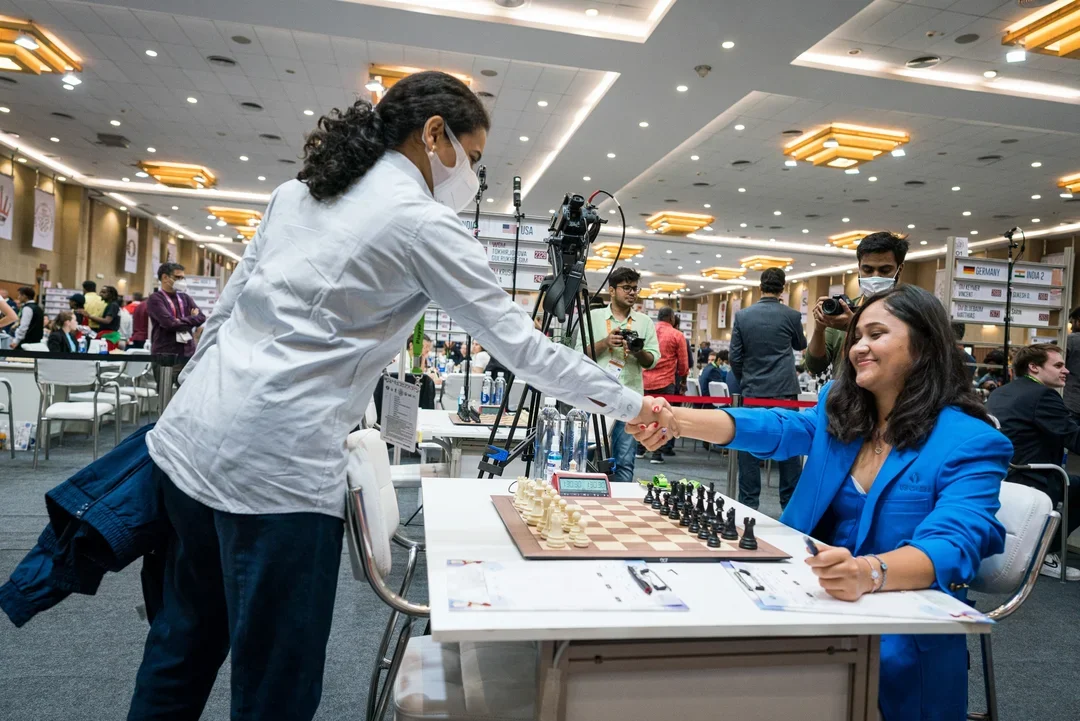
On board 1, WGM Gulrukhbegim Tokhirjonova had unpleasant task of facing the strong grandmaster, the almost 200-points higher-rated GM Humpy Koneru with the black pieces. When faced with 1. d4, Tokhirjonova wheeled out another Grunfeld. As in round nine, she had things solidly under control throughout the game, was never in trouble and could possibly have played for more at one point. But a draw was a very satisfactory result.
GM Irina Krush faced IM R. Vaishali (the sister of Praggnanandhaa, from India 2) on board two. Understandably, the Indian captain had decided to let the eight-month pregnant GM Harika Dronavalli sit the final round out.
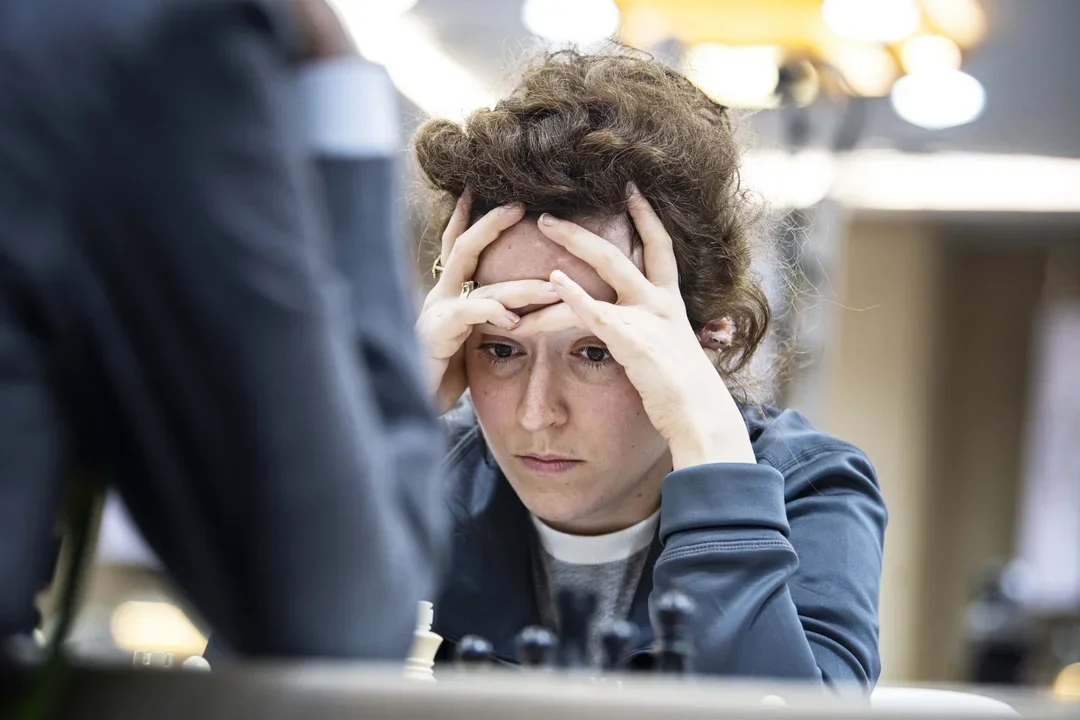
As on board one, the players went for a Grunfeld, but unlike Koneru, Krush had an advantage for the majority of the game. Unfortunately, Black was able to neutralize White’s pressure and was even able to pretend to play for a win at the end, but the draw was never in danger.
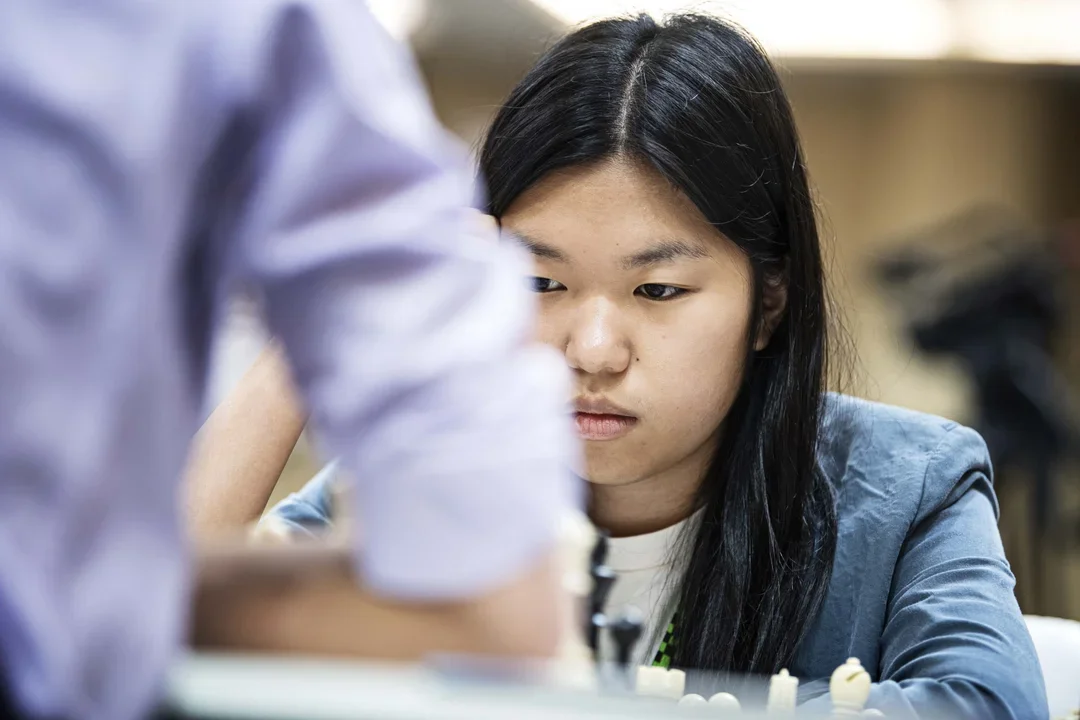
The well-known IM Tania Sachdev had scored an undefeated 8/10 on the Indian board three heading into the final round, but here she was facing IM Carissa Yip, who had also won her previous four games consecutively. Something had to give.
Playing for a win, Yip again went for her trusted King’s Indian. Sachdev played an interesting idea and could have gained an advantage. Once that moment passed and the game became a battle of who understood the King’s Indian better, the Indian player was no match for Yip, who despite some missteps in Sachdev’s time trouble, took home the full point.
On board four, the Indian captain called on IM Kulkarni Bhakti, who had only played four games in this Olympiad but had won each and every one of them! In a Two Knights Defense, Abrahamyan went for a somewhat unusual line which allowed Black to equalize, but when Black pushed too hard for more than that, White completely took over the game. This was a very one-sided victory and well-executed by Abrahamyan.
The end result was a brilliant 3-1 victory against favorites from India.

Team USA Individual scores:
WGM Gulrukhbegim Tokhirjonova: 7/10
GM Irina Krush: 7½/10
IM Carissa Yip: 6/9
IM Anna Zatonskih: 4/6
WGM Tatev Abrahamyan: 7/9
Looking at our results, Tokhirjonova on the difficult board one had yet another break-through performance. Krush did about as expected on board two, while Yip on board 3 started poorly but won her last five games to limit the rating loss. Zatonskih had a bit of a bad tournament, whereas Abrahamyan scored nicely and picked up some rating.
The losses to Mongolia in round 3 and Peru in round 5 cost dearly, but the final result, a fourth place finish was a good result for this seventh seeded team, even if they missed out on the medals by a hair.
The other top matches went as follows:
Ukraine-Poland – On board one, former women’s world champion GM Mariya Muzychuk had out-prepared the strong Pole IM Alina Kashlinskaya and basically was winning at the end of the prepared line, which she duly converted to a full point. On board three, another former women’s world champion, GM Anna Ushenina took down WIM Oliwia Kiolbasa, who previously had scored an unbelievable 9½/10.
Azerbaijan-Georgia – Georgia won 3-1 with victories by IM Salome Melia, who won a beautiful, thematic game and GM Nino Batsiashvili, who turned a terrible position around to win in the endgame.
Kazakhstan-India 3 – After a crushing loss to India 1 in round 10, Kazakhstan got some measure of revenge by winning this match.
Slovakia-India 2 – This matchup ended 2-2, not the result that either team needed.
These results led to the following final standing in the Women’s event:
The medal winners:
Gold: Ukraine 18 (TB 413½)
Silver: Georgia 18 (TB 392)
Bronze: India 17 (TB 396½)
Also on 17: USA (TB 390) and Kazakhstan (TB 352).
Quick Links
- Official FIDE Olympiad page
- Chess-results.com for pairings, standings: Open | Women
- Complete Coverage for Chess Life Online
Categories
Archives
- January 2026 (8)
- December 2025 (27)
- November 2025 (29)
- October 2025 (39)
- September 2025 (27)
- August 2025 (29)
- July 2025 (43)
- June 2025 (25)
- May 2025 (24)
- April 2025 (29)
- March 2025 (29)
- February 2025 (20)
- January 2025 (24)
- December 2024 (34)
- November 2024 (18)
- October 2024 (35)
- September 2024 (23)
- August 2024 (27)
- July 2024 (44)
- June 2024 (27)
- May 2024 (31)
- April 2024 (51)
- March 2024 (34)
- February 2024 (25)
- January 2024 (26)
- December 2023 (29)
- November 2023 (26)
- October 2023 (37)
- September 2023 (27)
- August 2023 (37)
- July 2023 (47)
- June 2023 (33)
- May 2023 (37)
- April 2023 (45)
- March 2023 (37)
- February 2023 (28)
- January 2023 (31)
- December 2022 (23)
- November 2022 (32)
- October 2022 (31)
- September 2022 (19)
- August 2022 (39)
- July 2022 (32)
- June 2022 (35)
- May 2022 (21)
- April 2022 (31)
- March 2022 (33)
- February 2022 (21)
- January 2022 (27)
- December 2021 (36)
- November 2021 (34)
- October 2021 (25)
- September 2021 (25)
- August 2021 (41)
- July 2021 (36)
- June 2021 (29)
- May 2021 (29)
- April 2021 (31)
- March 2021 (33)
- February 2021 (28)
- January 2021 (29)
- December 2020 (38)
- November 2020 (40)
- October 2020 (41)
- September 2020 (35)
- August 2020 (38)
- July 2020 (36)
- June 2020 (46)
- May 2020 (42)
- April 2020 (37)
- March 2020 (60)
- February 2020 (38)
- January 2020 (45)
- December 2019 (34)
- November 2019 (35)
- October 2019 (42)
- September 2019 (45)
- August 2019 (56)
- July 2019 (44)
- June 2019 (35)
- May 2019 (40)
- April 2019 (48)
- March 2019 (61)
- February 2019 (39)
- January 2019 (30)
- December 2018 (29)
- November 2018 (51)
- October 2018 (45)
- September 2018 (29)
- August 2018 (49)
- July 2018 (35)
- June 2018 (31)
- May 2018 (39)
- April 2018 (31)
- March 2018 (26)
- February 2018 (33)
- January 2018 (30)
- December 2017 (26)
- November 2017 (24)
- October 2017 (30)
- September 2017 (30)
- August 2017 (31)
- July 2017 (28)
- June 2017 (32)
- May 2017 (26)
- April 2017 (37)
- March 2017 (28)
- February 2017 (30)
- January 2017 (27)
- December 2016 (29)
- November 2016 (24)
- October 2016 (32)
- September 2016 (31)
- August 2016 (27)
- July 2016 (24)
- June 2016 (26)
- May 2016 (19)
- April 2016 (30)
- March 2016 (36)
- February 2016 (28)
- January 2016 (32)
- December 2015 (26)
- November 2015 (23)
- October 2015 (16)
- September 2015 (28)
- August 2015 (28)
- July 2015 (6)
- June 2015 (1)
- May 2015 (2)
- April 2015 (1)
- February 2015 (3)
- January 2015 (1)
- December 2014 (1)
- July 2010 (1)
- October 1991 (1)
- August 1989 (1)
- January 1988 (1)
- December 1983 (1)







